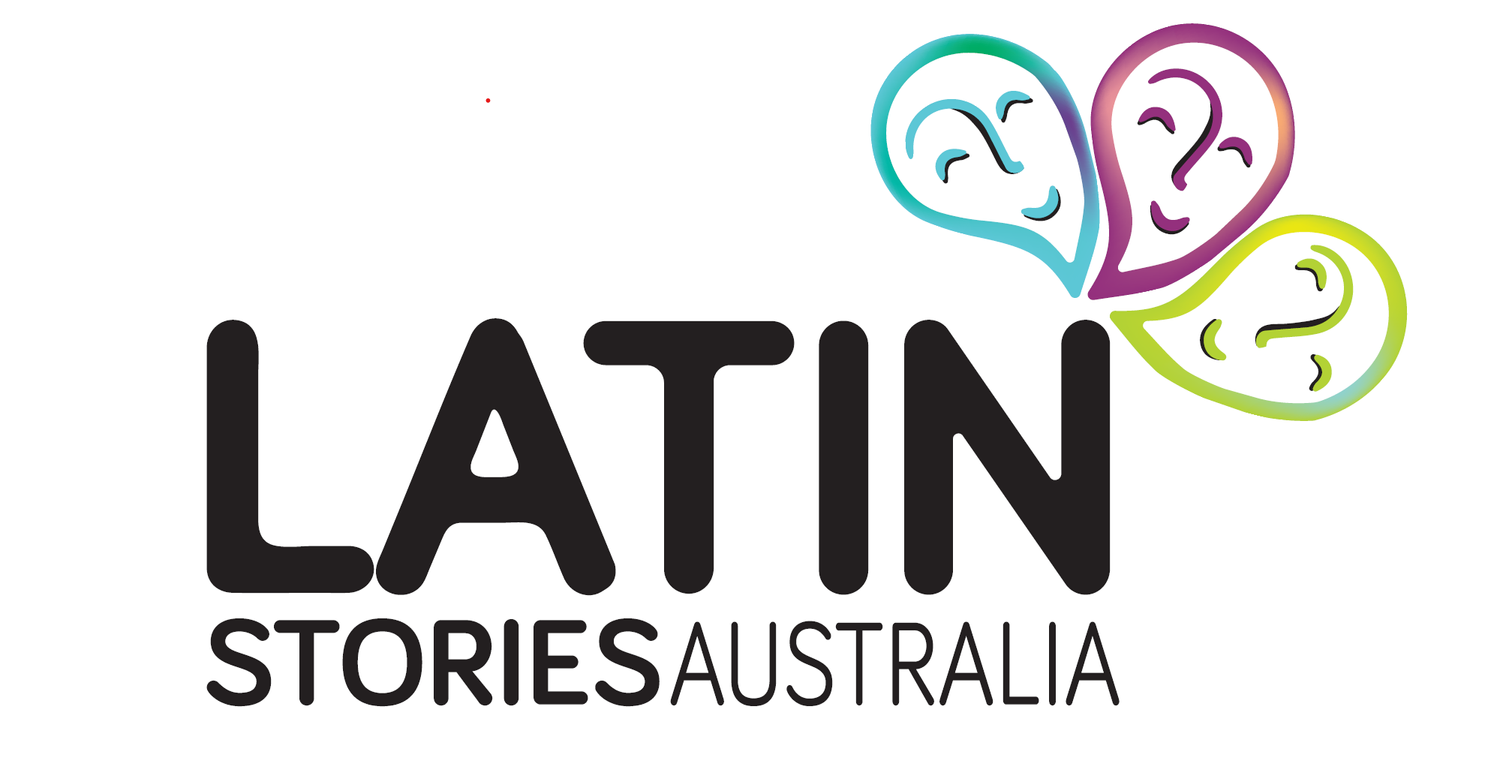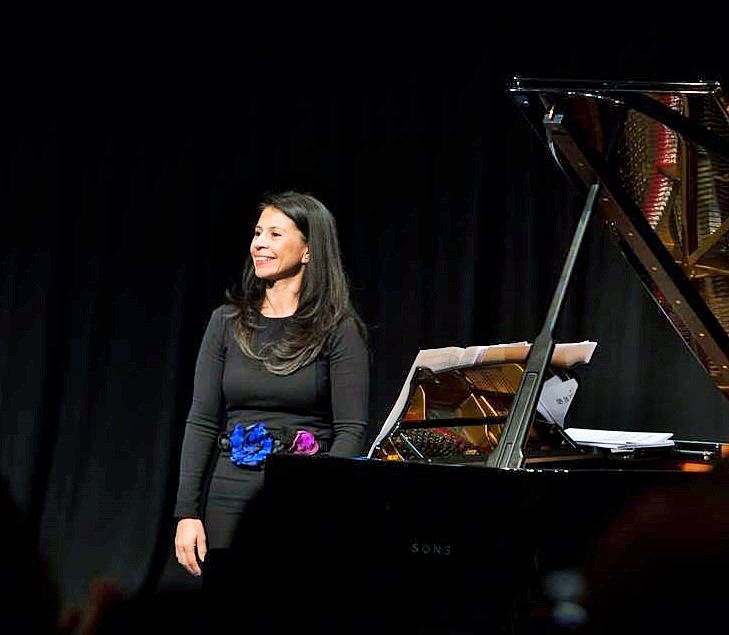Irma Enriquez
“Regardless of which stage of life you are in, it is important to believe in yourself”
Irma Enriquez
Country of Origin: Mexico
Occupation: Pianist, accompanist, researcher and music educator. State of Residency: NSW. Favourite place in Australia: Cairns. Upon arrival: Surprised by the shops closing at 5pm!
By Cristy Abela
Irma is a classical pianist whose professional career includes recitals of piano solos and duos in Mexico, Canada, USA, Spain, Italy and Australia. She is the recipient of the Vivid Sydney Creative Achievement Award 2015 and the Australian Hispanic Women Business Network Award 2010. In 2018 she received an honorable award from the embassies of Mexico and Venezuela at the ANU-ANCLAS in recognition for her remarkable and outstanding musical career and for her valuable contribution to promote Latin American cultural heritage in Australia. She currently divides her time between teaching piano and music for all ages and levels, concerts, conferences and family responsibilities.
Tell us your story
Irma in one of her concerts
In 1998 I met my now Australian husband during his travels through Mexico. After dating over a year we got married and moved to Australia in 2000. Upon arrival I really enjoyed discovering the magic of life in Sydney and the Australian way of life. To be able to work as a qualified and certified pianist, I validated my degree in piano through the Conservatorium in Sydney and with the Music Teacher Association of NSW. To learn new ways of collaboration and increase my local network I joined the St Mary’s Cathedral’s choir and I volunteered at the Mexican consulate helping with promotion and coordination of cultural events. I also offered my Mexican piano music services to the Mexican Embassy and Consulate (there was nobody playing Mexican classic music). I coordinated two music recitals in the National Gallery of Canberra supporting the Frida Kahlo exhibition (2001) and the Latin Contemporary art (2002). Since then I have been promoting the classic Mexican, Latin-American and Spanish music, in particular music from the 20th and 21st centuries. At that time I was also interested in better understanding the needs of students with special needs. So, I took several courses in Applied Behaviour Analysis (ABA). To apply this new knowledge I volunteered working at a school for students diagnosed with autism. After few months I developed a pilot music program for one of the classes. At the end of the course, the principal offered me a position as coordinator of the Music program. I worked there for six and a half years combining the rolls of music teacher and ABA therapist. This experience has helped me to develop better approaches and programs for piano students.
I met violinist Henry Avila in 2008 when we both participated in the concerts of contemporary Latin American Chamber Music. Our shared interest to promote our national music heritage in Australia motivated us to found in 2009 the Duo Deconet Inc. (a non-profit association). Our aim is to promote the music of a new generation of established living Latin American composers, regularly offering premieres in the Asia-Pacific region. We have been lucky to collaborate with a range of composers and have performed around Australia. In 2018 I started a group dedicated to promoting music from the 20th and 21st centuries called MIA – Music from Iberoamerica in Australia. The concerts we have presented involve music, poetry, dance, films, painting and voice; all with the aim to preserve the vast heritage of Latin American and the Spanish culture in Australia, including collaborations with local artist and from abroad.
I have been recognised for my professional career in several instances. For example, I have been formally included in four books: A Chronological History of Australian Composers and musicians by S. Pleskun (2012); The Swallows: women’s stories-an Anthology by Hispanic Women writers (2012); Identity and Memory: 20 Stories of Latin American Women by S. Alfaro Enriquez (2014); and 10 años 2007-2017 STANSW Spanish Teachers' Association of NSW STANSW by L. Sosa (2018). I have also participated in several Hispanic and Australian radio interviews. In 2017 I participated in the documentary: ‘Mujer, tu me inspiras’- ‘Women you inspire me’ for SBS Spanish. I have been guest speaker in the ‘Music for children with special needs’ conference and the ‘Women day’ for the Latin American community conference.
To keep up with trends I constantly attend piano courses. I also and attend international conferences by the Australian National University –ANCLAS, Music teachers Association of NSW and in the Spanish Teachers Association of NSW where I present papers. I feel really proud when some of my students visit nursing homes, bringing music to the elderly community and sharing their love of music.
Challenges
Getting your foot in the door – As an independent musician with no Australian references, entering the classical musical society scene in Australia was tough. To meet people and broaden my network I volunteered with a range of groups. I also took courses for teachers at the Conservatorium in Sydney, and participated in various conferences. Currently, I continue to collaborate with annual concerts and projects in Canberra, Melbourne and Sydney.
Starting a business – Establishing my piano studio has not been easy as I have had to learn the do’s and don’ts of running a private business. I have also had to learn to balance my time between the business and the family. I have been working hard with honesty, and constantly expanding my skills in the musical and the education for special needs sectors.
Loneliness - Life can get lonely without family over here, but this has given me the opportunity to create my own family and connect with a fantastic circle of Latin-American and Australian friends.
Irma receiving an honorable award for her outstanding musical career and her contribution to promote Latin American cultural heritage in Australia
Contrasts
Openness - Australians, as a society, tend to be more reserved and with more rigid agendas. We, as Latinos, welcome recent acquaintances or old friends for a visit in our homes any time of the day without notice.
Appreciation – Overall, I believe that the Australian audience likes to learn about other cultures and appreciate concerts which showcase our heritage. In Latin America there is less access to multicultural events; therefore, we are less exposed to appreciate other cultures.
Education for special needs – Australia has incredible public programs in place for people with special needs (including music programs). Mexico, as an emerging economy, has less funding available for these types of program.
Piece of advice
Be prepared but be realistic - Prepare yourself professionally as much as you can as this will give you tools to succeed in life. However, you also have to be realistic about expectations within the Australia industry of which you want to be a part of.
Believe in yourself - Regardless of which stage of life you are in, it is important to believe in yourself and give your 100% or more effort!
In the next few years…
Irma would like to see herself presenting more exciting music around Australia. She is looking forward to launching another CD with various artists. One of her dreams is to motivate the future generations of Australian musicians to include more Latin-American music in their performances.




